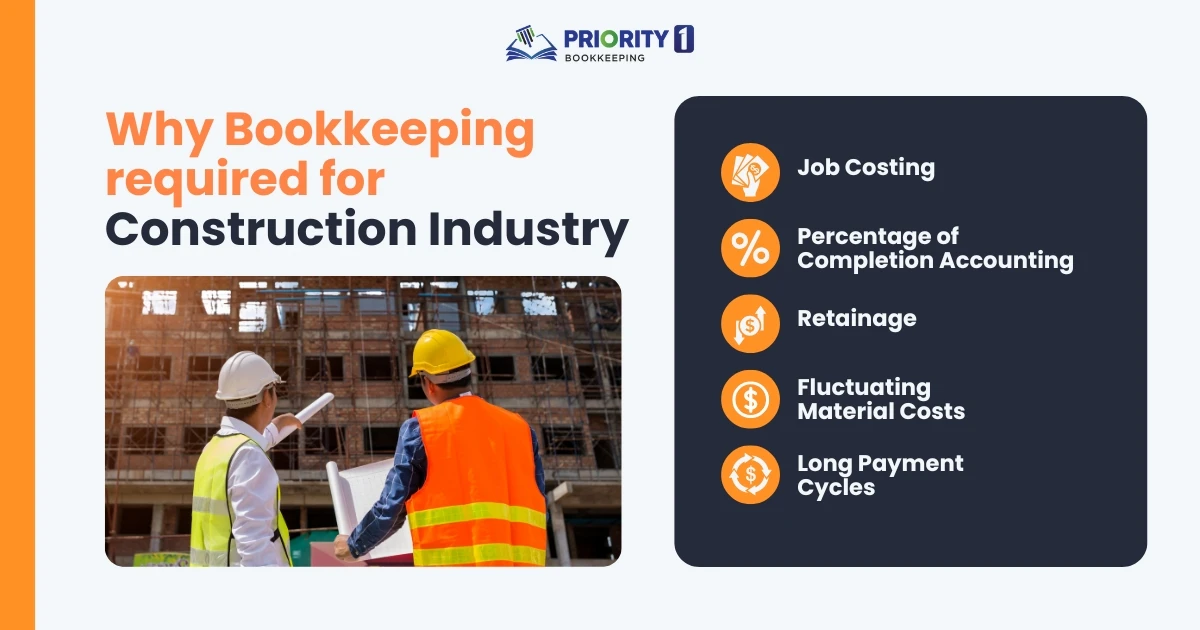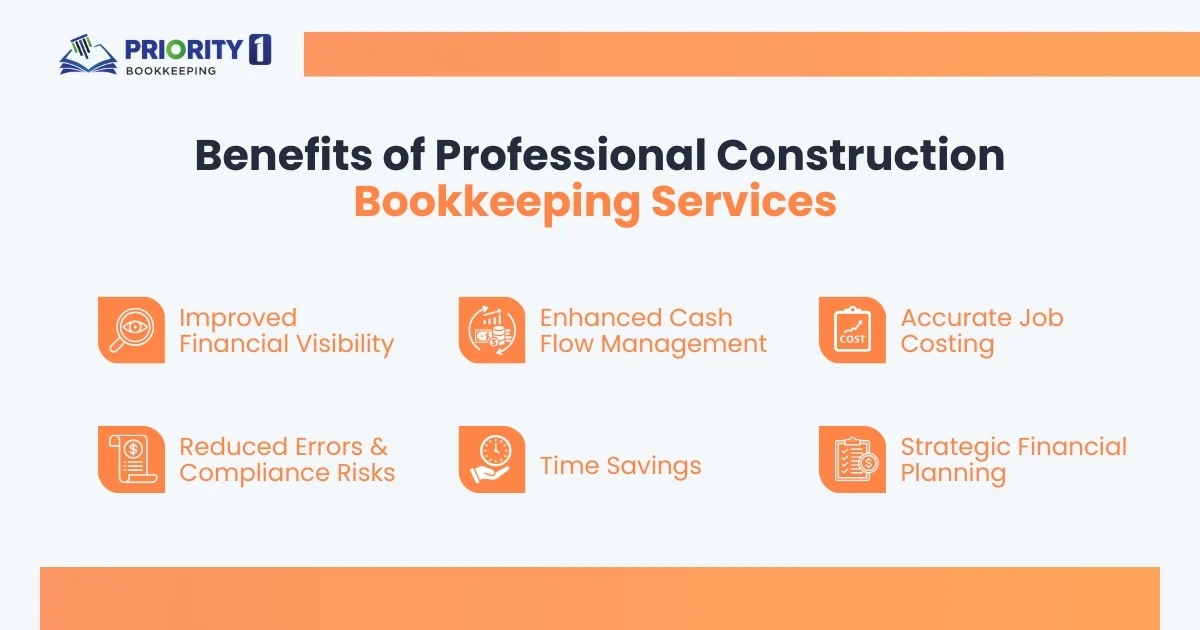
Introduction: The Cornerstone of Construction Profitability
The construction industry is known for its complexity, not just in terms of on-site operations but also in managing financial records. Construction businesses often struggle with fluctuating costs, long payment cycles, and unpredictable project expenses. Without accurate and timely bookkeeping, even the most successful contractors can find themselves facing financial instability.
Solid bookkeeping is more than just a legal requirement; it is the backbone of a profitable and sustainable construction business. With proper financial tracking, construction firms can ensure consistent cash flow, manage budgets effectively, and make informed business decisions that lead to growth and success.
The Unique Bookkeeping Needs of Construction

Unlike other industries with straightforward accounting needs, construction bookkeeping involves a dynamic and intricate financial structure. Here are some key financial complexities unique to construction businesses:
- Job Costing – Each project has different expenses, requiring detailed tracking to ensure profitability.
- Percentage of Completion Accounting – Revenue recognition can be challenging, as projects are billed in phases rather than all at once.
- Retainage – A portion of payments is withheld until project completion, impacting cash flow.
- Fluctuating Material Costs – Prices of raw materials like lumber and steel change frequently, requiring flexible budgeting.
- Long Payment Cycles – Payments from clients can take months, making cash flow management crucial.
Using generic bookkeeping methods often fails to capture these unique aspects, making specialised construction bookkeeping essential.
Bookkeeping Services for Construction: An Overview
Construction bookkeeping encompasses a variety of financial management tasks, including:
- Accounts Payable & Receivable – Ensuring timely payments to suppliers and tracking incoming revenue.
- Job Costing & Project Accounting – Monitoring all expenses associated with specific projects.
- Payroll Management – Handling wages, benefits, and tax withholdings for employees and subcontractors.
- Financial Reporting & Tax Preparation – Generating accurate financial statements and ensuring tax compliance.
Many construction businesses benefit from outsourcing bookkeeping services, gaining access to expert financial management without the burden of in-house accounting. Professional bookkeeping firms provide specialised knowledge, reduce errors, and free up business owners to focus on operations.
Benefits of Professional Construction Bookkeeping Services

Hiring a professional bookkeeping service offers numerous advantages that directly impact profitability and efficiency:
1. Improved Financial Visibility
Having real-time access to accurate financial data allows construction business owners to make informed decisions, avoid cash flow shortages, and allocate resources effectively.
2. Enhanced Cash Flow Management
Cash flow is the lifeblood of any construction business. A strong bookkeeping system ensures that incoming and outgoing funds are well managed, helping businesses stay afloat during long payment cycles.
3. Accurate Job Costing
Tracking project costs helps construction companies determine which projects are profitable and where expenses can be minimised, preventing budget overruns.
4. Reduced Errors and Compliance Risks
A dedicated bookkeeping service helps ensure accurate financial records, minimising costly errors, and keeping the business compliant with tax laws and industry regulations.
5. Time Savings
Instead of spending countless hours managing financial records, business owners and managers can focus on delivering quality projects, securing new contracts, and expanding their business.
6. Strategic Financial Planning
With precise bookkeeping, construction businesses can plan for growth, make data-driven investment decisions, and create sustainable financial strategies.
Limitations of Construction Bookkeeping Services (and How to Mitigate Them)
While outsourcing bookkeeping provides numerous benefits, there are some potential drawbacks to consider:
- Cost – Hiring a professional bookkeeping service can be an additional expense, but it is often outweighed by the savings and financial benefits it provides.
- Dependence on Service Providers – Businesses may feel reliant on external bookkeeping services, making it important to choose a reliable and experienced partner.
- Data Security Concerns – Financial data is sensitive, so businesses should ensure that their bookkeeping provider has robust security measures in place.
Mitigating these limitations involves selecting a reputable bookkeeping service with transparent communication, strong data security policies, and a clear understanding of the construction industry’s unique financial needs.
How Priority1 Bookkeeping Supports Construction and Real Estate
Priority1 Bookkeeping specialises in tailored bookkeeping solutions for the construction and real estate industries. Here’s how Priority1 stands out:
- Industry Expertise – Years of experience in construction bookkeeping ensure that financial management aligns with industry-specific challenges.
- Advanced Job Costing Solutions – Utilising technology and financial strategies to track and optimise project expenses.
- Seamless Compliance Management – Ensuring businesses stay compliant with tax regulations, licensing requirements, and financial reporting standards.
- Technology Integration – Using cloud-based accounting software and automation tools to improve accuracy and efficiency.
- Client Success Stories – Numerous construction businesses have experienced improved financial stability and growth with Priority1’s expert bookkeeping support.
Choosing the Right Bookkeeping Partner for Your Construction Business
Selecting the right bookkeeping service provider is crucial for ensuring financial efficiency. Here are key factors to consider:
- Industry-Specific Experience – Choose a provider with proven expertise in construction bookkeeping.
- Transparent Communication – A reliable partner should provide regular financial reports and insights.
- Technology Integration – Ensure the bookkeeping service works seamlessly with existing construction management tools.
- Client Reviews & Testimonials – Checking references and client feedback can help in selecting a trustworthy provider.
Conclusion: Building a Strong Financial Foundation
Strong bookkeeping practices are a vital component of success in the construction industry. Accurate financial tracking helps businesses manage cash flow, improve profitability, and scale operations efficiently. Partnering with a professional bookkeeping service like Priority1 can make all the difference in maintaining financial stability and achieving long-term growth.
